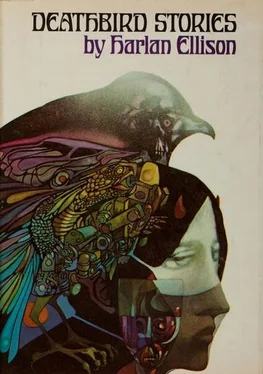Harlan Ellison
DEATHBIRD STORIES
WITH SOME WEARINESS, BUT NOT MUCH MORE WISDOM, THIS BOOK IS DEDICATED TO TRUE LOVE, WHATEVER LOVELY FACE IT WEARS
TO COUNT LEO TOLSTOY
14 February 1910
“To me God does not yet exist; but there is a creative force constantly struggling to evolve an executive organ of godlike knowledge and power: that is, to achieve omnipotence and omniscience; and every man and woman born is a fresh attempt to achieve this object….
“The current theory that God already exists in perfection involves the believe that God deliberately created something lower than Himself when He might just as easily have created something equally perfect. That is a horrible believe…
“You said that my manner in [Man and superman] was not serious enough, that I made people laugh in my most earnest moments. But why should I not? Why should humor and laughter be excommunicated? Suppose the world were only one of God’s jokes, would you work any the less to make it a good joke instead of a bad one?”
—GEORGE BERNARD SHAW
“If God did not exist, it would be necessary to invent him.”
—VOLTAIR:
Epître à M. Saurin , 10 Novembre 1770
“It is expedient there should be gods, and, since it is expedient, let us believe that gods exist.”
—OVID:
Ars Amatoria I
“Men rarely (if ever) manage to dream up a god superior to themselves. Most gods have the manners and morals of a spoiled child.”
—ROBERT A. HEINLEIN, 1973
It is suggested that the reader not attempt to read this book at one sitting. The emotional content of these stories, taken without break, may be extremely upsetting. This note is intended most sincerely, and not as hyperbole.
H.E.
Introduction:
Oblations at Alien Altars
Gods can do anything. They fear nothing: they are gods. But there is one rule, one Seal of Solomon that can confound a god, and to which all gods pay service, to the letter:
When belief in a god dies, the god dies.
When the last acolyte renounces his faith and turns to another deity, the god ceases to be.
They know the terrible simplicity of that truth, the mightiest and the mingiest of gods. They have seen their fellow gods go down to obscurity and banishment for lack of believers. They saw Achelous wither when the cornucopia was ripped from his head by Heracles; they saw the twelve Aesir and their Asgardian heaven-home turned to mist when the Vikings took up the cross; they saw Ahriman dwindle and die when the ancient Persian empire was overrun; they saw Alaghom Naom, the “Mother of Mind,” lost to men when the Conquistadores brutalized the Mayan religion; they saw Ama-Terasu, the Japanese sun goddess, go up in a nova of light brighter than the sun from which she took her name, on a special day in Hiroshima; and Amen-Ra, and Anaitis, and Anath, and Anshar (and Kishar), and Anu, and Anubis, and Apollo…all of them shimmered and became insubstantial as their temples were reduced to rubble.
Volume after volume of sacred books of gods.
And that’s only into the “A’s.”
As the time passes for men and women, so does it pass for gods, for they are made viable and substantial only through the massed beliefs of masses of men and women. And when puny mortals no longer worship at their altars, the gods die.
To be replaced by newer, more relevant gods.
Perhaps one day soon the time will pass for Jehovah and Buddha and Zoroaster and Brahma. Then the Earth will know other gods.
Already we begin to worship these other, newer gods. Already the Church fights to hold its own. The young grow away from the old religions, the world seems to swing between the old and the new; more and more each day interest in the occult, in the magical, in the phantasmagorical surges to the fore—leaving priests and rabbis and ministers concerned where their next god will come from.
This group of stories deals with the new gods, with the new devils, with the modern incarnations of the little people and the wood sprites and the demons. The grimoires and Necronomicons of the gods of the freeway, of the ghetto blacks, of the coaxial cable; the paingod and the rock god and the god of neon; the god of legal tender, the god of business-as-usual and the gods that live in city streets and slot machines. The God of Smog and the God of Freudian Guilt. The Machine God.
They are a strange, unpredictable lot, these new, vital, muscular gods. How we will come to worship them, what boons they may bestow, their moods and their limitations—these are the subjects of these stories.
A New Testament of deities for the computerized age of confrontation and relevance. A grimoire and a guide. A pantheon of the holiest of holies for modern man.
Know them now…they rule the nights through which we move.
Kitty Genovese met one of them, as did the students of Kent State University. Black men have known them far longer than white men, but have been ill served by them.
So know them now, in these stories. Offerings can be made at their altars in new-car showrooms and gambling casinos and in crashpads and penthouses.
Worship in the temple of your soul, but know the names of those who control your destiny. For, as the God of Time so aptly put it, “It’s later than you think.”
HARLAN ELLISON 1 November 1973
When the new god comes to the Big Apple, its Kyrie Eleison turns out to be a prayer Kitty Genovese simply couldn’t sing. But thirty-eight others knew the tune.
The Whimper of Whipped Dogs
On the night after the day she had stained the louvered window shutters of her new apartment on East 52nd Street, Beth saw a woman slowly and hideously knifed to death in the courtyard of her building. She was one of twenty-six witnesses to the ghoulish scene, and, like them, she did nothing to stop it.
She saw it all, every moment of it, without break and with no impediment to her view. Quite madly, the thought crossed her mind as she watched in horrified fascination, that she had the sort of marvelous line of observation Napoleon had sought when he caused to have constructed at the Comédie-Française theaters, a curtained box at the rear, so he could watch the audience as well as the stage. The night was clear, the moon was full, she had just turned off the 11:30 movie on channel 2 after the second commercial break, realizing she had already seen Robert Taylor in Westward the Women, and had disliked it the first time; and the apartment was quite dark.
She went to the window, to raise it six inches for the night’s sleep, and she saw the woman stumble into the courtyard. She was sliding along the wall, clutching her left arm with her right hand. Con Ed had installed mercury-vapor lamps on the poles; there had been sixteen assaults in seven months; the courtyard was illuminated with a chill purple glow that made the blood streaming down the woman’s left arm look black and shiny. Beth saw every detail with utter clarity, as though magnified a thousand power under a microscope, solarized as if it had been a television commercial.
The woman threw back her head, as if she were trying to scream, but there was no sound. Only the traffic on First Avenue, late cabs foraging for singles paired for the night at Maxwell’s Plum and Friday’s and Adam’s Apple. But that was over there, beyond. Where she was, down there seven floors below, in the courtyard, everything seemed silently suspended in an invisible force-field.
Beth stood in the darkness of her apartment, and realized she had raised the window completely. A tiny balcony lay just over the low sill; now not even glass separated her from the sight; just the wrought iron balcony railing and seven floors to the courtyard below.
Читать дальше












